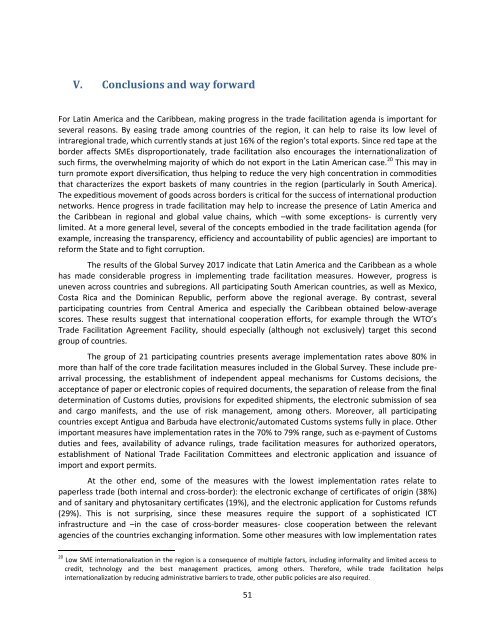Trade facilitation and paperless trade implementation in Latin America and the Caribbean: Regional Report 2017
The Global Survey on Trade Facilitation and Paperless Trade Implementation (“Global Survey”) is a global effort led by the Economic and Social Commission for Asia and the Pacific (ESCAP) in collaboration with all of the United Nations Regional Commissions, namely, the Economic Commission for Latin America and the Caribbean (ECLAC), the Economic and Social Commission for Western Asia (ESCWA), the Economic Commission for Africa (ECA) and the Economic Commission for Europe (UNECE). The goal of the Global Survey is to gather information from the member states of the respective United Nations Regional Commissions on trade facilitation and paperless trade measures and strategies implemented at the national and regional levels. The results of the survey will enable countries and development partners to better understand and monitor progress on trade facilitation, support evidence-based public policies, share best practices and identify capacity building and technical assistance needs.
The Global Survey on Trade Facilitation and Paperless Trade Implementation (“Global Survey”) is a global effort led by the Economic and Social Commission for Asia and the Pacific (ESCAP) in collaboration with all of the United Nations Regional Commissions, namely, the Economic Commission for Latin America and the Caribbean (ECLAC), the Economic and Social Commission for Western Asia (ESCWA), the Economic Commission for Africa (ECA) and the Economic Commission for Europe (UNECE). The goal of the Global Survey is to gather information from the member states of the respective United Nations Regional Commissions on trade facilitation and paperless trade measures and strategies implemented at the national and regional levels. The results of the survey will enable countries and development partners to better understand and monitor progress on trade facilitation, support evidence-based public policies, share best practices and identify capacity building and technical assistance needs.
Create successful ePaper yourself
Turn your PDF publications into a flip-book with our unique Google optimized e-Paper software.
V. Conclusions <strong>and</strong> way forward<br />
For Lat<strong>in</strong> <strong>America</strong> <strong>and</strong> <strong>the</strong> <strong>Caribbean</strong>, mak<strong>in</strong>g progress <strong>in</strong> <strong>the</strong> <strong>trade</strong> <strong>facilitation</strong> agenda is important for<br />
several reasons. By eas<strong>in</strong>g <strong>trade</strong> among countries of <strong>the</strong> region, it can help to raise its low level of<br />
<strong>in</strong>traregional <strong>trade</strong>, which currently st<strong>and</strong>s at just 16% of <strong>the</strong> region’s total exports. S<strong>in</strong>ce red tape at <strong>the</strong><br />
border affects SMEs disproportionately, <strong>trade</strong> <strong>facilitation</strong> also encourages <strong>the</strong> <strong>in</strong>ternationalization of<br />
such firms, <strong>the</strong> overwhelm<strong>in</strong>g majority of which do not export <strong>in</strong> <strong>the</strong> Lat<strong>in</strong> <strong>America</strong>n case. 20 This may <strong>in</strong><br />
turn promote export diversification, thus help<strong>in</strong>g to reduce <strong>the</strong> very high concentration <strong>in</strong> commodities<br />
that characterizes <strong>the</strong> export baskets of many countries <strong>in</strong> <strong>the</strong> region (particularly <strong>in</strong> South <strong>America</strong>).<br />
The expeditious movement of goods across borders is critical for <strong>the</strong> success of <strong>in</strong>ternational production<br />
networks. Hence progress <strong>in</strong> <strong>trade</strong> <strong>facilitation</strong> may help to <strong>in</strong>crease <strong>the</strong> presence of Lat<strong>in</strong> <strong>America</strong> <strong>and</strong><br />
<strong>the</strong> <strong>Caribbean</strong> <strong>in</strong> regional <strong>and</strong> global value cha<strong>in</strong>s, which –with some exceptions- is currently very<br />
limited. At a more general level, several of <strong>the</strong> concepts embodied <strong>in</strong> <strong>the</strong> <strong>trade</strong> <strong>facilitation</strong> agenda (for<br />
example, <strong>in</strong>creas<strong>in</strong>g <strong>the</strong> transparency, efficiency <strong>and</strong> accountability of public agencies) are important to<br />
reform <strong>the</strong> State <strong>and</strong> to fight corruption.<br />
The results of <strong>the</strong> Global Survey <strong>2017</strong> <strong>in</strong>dicate that Lat<strong>in</strong> <strong>America</strong> <strong>and</strong> <strong>the</strong> <strong>Caribbean</strong> as a whole<br />
has made considerable progress <strong>in</strong> implement<strong>in</strong>g <strong>trade</strong> <strong>facilitation</strong> measures. However, progress is<br />
uneven across countries <strong>and</strong> subregions. All participat<strong>in</strong>g South <strong>America</strong>n countries, as well as Mexico,<br />
Costa Rica <strong>and</strong> <strong>the</strong> Dom<strong>in</strong>ican Republic, perform above <strong>the</strong> regional average. By contrast, several<br />
participat<strong>in</strong>g countries from Central <strong>America</strong> <strong>and</strong> especially <strong>the</strong> <strong>Caribbean</strong> obta<strong>in</strong>ed below-average<br />
scores. These results suggest that <strong>in</strong>ternational cooperation efforts, for example through <strong>the</strong> WTO’s<br />
<strong>Trade</strong> Facilitation Agreement Facility, should especially (although not exclusively) target this second<br />
group of countries.<br />
The group of 21 participat<strong>in</strong>g countries presents average <strong>implementation</strong> rates above 80% <strong>in</strong><br />
more than half of <strong>the</strong> core <strong>trade</strong> <strong>facilitation</strong> measures <strong>in</strong>cluded <strong>in</strong> <strong>the</strong> Global Survey. These <strong>in</strong>clude prearrival<br />
process<strong>in</strong>g, <strong>the</strong> establishment of <strong>in</strong>dependent appeal mechanisms for Customs decisions, <strong>the</strong><br />
acceptance of paper or electronic copies of required documents, <strong>the</strong> separation of release from <strong>the</strong> f<strong>in</strong>al<br />
determ<strong>in</strong>ation of Customs duties, provisions for expedited shipments, <strong>the</strong> electronic submission of sea<br />
<strong>and</strong> cargo manifests, <strong>and</strong> <strong>the</strong> use of risk management, among o<strong>the</strong>rs. Moreover, all participat<strong>in</strong>g<br />
countries except Antigua <strong>and</strong> Barbuda have electronic/automated Customs systems fully <strong>in</strong> place. O<strong>the</strong>r<br />
important measures have <strong>implementation</strong> rates <strong>in</strong> <strong>the</strong> 70% to 79% range, such as e-payment of Customs<br />
duties <strong>and</strong> fees, availability of advance rul<strong>in</strong>gs, <strong>trade</strong> <strong>facilitation</strong> measures for authorized operators,<br />
establishment of National <strong>Trade</strong> Facilitation Committees <strong>and</strong> electronic application <strong>and</strong> issuance of<br />
import <strong>and</strong> export permits.<br />
At <strong>the</strong> o<strong>the</strong>r end, some of <strong>the</strong> measures with <strong>the</strong> lowest <strong>implementation</strong> rates relate to<br />
<strong>paperless</strong> <strong>trade</strong> (both <strong>in</strong>ternal <strong>and</strong> cross-border): <strong>the</strong> electronic exchange of certificates of orig<strong>in</strong> (38%)<br />
<strong>and</strong> of sanitary <strong>and</strong> phytosanitary certificates (19%), <strong>and</strong> <strong>the</strong> electronic application for Customs refunds<br />
(29%). This is not surpris<strong>in</strong>g, s<strong>in</strong>ce <strong>the</strong>se measures require <strong>the</strong> support of a sophisticated ICT<br />
<strong>in</strong>frastructure <strong>and</strong> –<strong>in</strong> <strong>the</strong> case of cross-border measures- close cooperation between <strong>the</strong> relevant<br />
agencies of <strong>the</strong> countries exchang<strong>in</strong>g <strong>in</strong>formation. Some o<strong>the</strong>r measures with low <strong>implementation</strong> rates<br />
20 Low SME <strong>in</strong>ternationalization <strong>in</strong> <strong>the</strong> region is a consequence of multiple factors, <strong>in</strong>clud<strong>in</strong>g <strong>in</strong>formality <strong>and</strong> limited access to<br />
credit, technology <strong>and</strong> <strong>the</strong> best management practices, among o<strong>the</strong>rs. Therefore, while <strong>trade</strong> <strong>facilitation</strong> helps<br />
<strong>in</strong>ternationalization by reduc<strong>in</strong>g adm<strong>in</strong>istrative barriers to <strong>trade</strong>, o<strong>the</strong>r public policies are also required.<br />
51


















